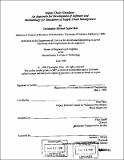Supply chain simulator : an approach for development of software and methodology for simulation of supply chain management
Author(s)
Holt, Christopher Michael Taylor, 1968-
DownloadFull printable version (10.03Mb)
Other Contributors
Massachusetts Institute of Technology. Dept. of Civil and Environmental Engineering.
Advisor
Peter Metz and Yossi Sheffi.
Terms of use
Metadata
Show full item recordAbstract
Many companies see how new strategies and technologies can enable more efficient and adaptive supply chains-but they struggle to understand how these technologies overlay with existing processes and personnel issues both during and after implementation. This thesis investigates the concept of a simulated environment where multiple constituents whether they are different parts of a company's organization or different companies within a supply chain-can come together to design and experiment with new supply chain structures. The thesis explores the argument that the supply chain can be simulated, and evaluates different approaches to developing such a simulation that would allow low-risk experimentation and accelerated learning for supply chain managers. The thesis begins with an executive summary that provides a high level treatment of the challenges and recommendations associated with supply chain simulation, then proceeds to present a definition of the elaborate interrelationships between companies, technologies and business processes that collectively shape an industry's supply chain. This is followed by a discussion of complexity theory and general simulation techniques that could be applicable to the development of a software simulation environment in this area. Then, a review of efforts to date to simulate management of the supply chain, including approach, resources required, and eventual results is followed by a recommendation and justification of the thesis' approach to supply chain simulation. Finally, operating methods are presented for development and management of the learning and decision-making processes required to best utilize the software. The conclusion of the thesis is that because of the emergence of new technologies, the supply chain can be simulated for practical experimentation and learning. It is apparent that significant supply chain performance improvement can be identified and quantified through simulation. The thesis recommends using agent-based modeling, specifically a software package called Swarm, as the software environment. The software should be supported by operating methods that can maximize its capabilities while encouraging the likelihood of adoption of solutions identified.
Description
Thesis (M.Eng.)--Massachusetts Institute of Technology, Dept. of Civil and Environmental Engineering, 1999. Includes bibliographical references (leaves 94-97).
Date issued
1999Department
Massachusetts Institute of Technology. Department of Civil and Environmental EngineeringPublisher
Massachusetts Institute of Technology
Keywords
Civil and Environmental Engineering.